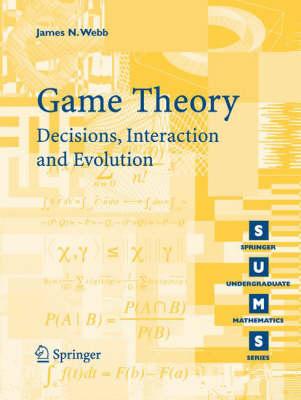Overview
This book is an introduction to game theory from a mathematical perspective. It is intended to be a ?rst course for undergraduate students of mathematics, but I also hope that it will contain something of interest to advanced students or researchers in biology and economics who often encounter the basics of game theory informally via relevant applications. In view of the intended audience, the examples used in this book are generally abstract problems so that the reader is not forced to learn a great deal of a subject – either biology or e- nomics – that may be unfamiliar. Where a context is given, these are usually “classical” problems of the subject area and are, I hope, easy enough to follow. The prerequisites are generally modest. Apart from a familiarity with (or a willingness to learn) the concepts of a proof and some mathematical no- tion, the main requirement is an elementary understanding of probability. A familiarity with basic calculus would be useful for Chapter 6 and someparts of Chapters 1 and 8. The basic ideas of simple ordinary di?erential equations are required in Chapter 9 and, towards the end of that chapter, some familiarity with matrices would be an advantage – although the relevant ideas are brie?y described in an appendix.
Full Product Details
Author: James N. Webb
Publisher: Springer London Ltd
Imprint: Springer London Ltd
Edition: 2007 ed.
Dimensions:
Width: 17.80cm
, Height: 1.20cm
, Length: 23.50cm
Weight: 0.446kg
ISBN: 9781846284236
ISBN 10: 1846284236
Pages: 242
Publication Date: 01 December 2006
Audience:
Professional and scholarly
,
Professional & Vocational
Format: Paperback
Publisher's Status: Active
Availability: In Print

This item will be ordered in for you from one of our suppliers. Upon receipt, we will promptly dispatch it out to you. For in store availability, please contact us.
Reviews
From the reviews: <p> A single-semester elective course in game theory would be an attractive feature of any undergraduate mathematics program. Students would get to use the various mathematical skills they have acquired in a thought-provoking applied context. The book under review is intended as a textbook for such a course. a ] Certainly the choice of topics and overall organization is good. (David P. Roberts, MathDL, August, 2007)
From the reviews: This is supposed to be a mathematical introduction to game theory for undergraduate students. I think both students of economics and mathematics (both with a course of calculus, linear algebra and optimization in Rn) can use this book. The idea of the book is to provide the 'intuition' behind some important theorems of game theory. (Philosophy, Religion and Science Book Reviews, bookinspections.wordpress.com, March, 2014) A single-semester elective course in game theory would be an attractive feature of any undergraduate mathematics program. Students would get to use the various mathematical skills they have acquired in a thought-provoking applied context. The book under review is intended as a textbook for such a course. ... Certainly the choice of topics and overall organization is good. (David P. Roberts, MathDL, August, 2007)
From the reviews: A single-semester elective course in game theory would be an attractive feature of any undergraduate mathematics program. Students would get to use the various mathematical skills they have acquired in a thought-provoking applied context. The book under review is intended as a textbook for such a course. ... Certainly the choice of topics and overall organization is good. (David P. Roberts, MathDL, August, 2007)
Author Information
James Webb is a former lecturer at Nottingham Trent University, UK




